Kaiser Health Tracking Poll – October 2017: Open Enrollment and the ACA Marketplaces
Findings
KEY FINDINGS:
- The October Kaiser Health Tracking Poll focuses on the Affordable Care Act’s (ACA) marketplaces as the November 1st open enrollment period approaches, amidst a period of uncertainty on the future of the individual market. The majority of the public think it is more important for President Trump and Congress to work on legislation to stabilize the marketplaces rather than continue efforts to repeal and replace the 2010 health care law (66 percent vs. 29 percent). There are distinct differences by party with the majority of Democrats (85 percent) and independents (67 percent) saying legislation to stabilize the marketplaces is more important while about half of Republicans (51 percent) say it is more important for lawmakers to continue efforts to repeal and replace the 2010 health care law.
Poll: Most want Congress to continue cost-sharing reduction payments as part of bipartisan marketplace deal
- One proposed step Congress could take to stabilize the markets and control costs for people who purchase their plans on their own is to guarantee payments to insurance companies that help cover the cost of deductibles and copayments for lower-income Americans (known commonly as ‘cost-sharing reduction’ (CSR) payments). The Trump Administration has announced they will stop making these payments. While initially the majority of Republicans (55 percent) say these payments should be stopped, when asked whether they support Congress guaranteeing the funds to continue the CSR payments when the proposal is included in a bipartisan compromise that would give states more flexibility in the types of plan sold in their state’s marketplace, a majority of the public (69 percent) – including roughly equal shares of Democrats (69 percent), independents (70 percent), and Republicans (68 percent) – support such a compromise.
- Overall favorability of the ACA increased over the past month with about half (51 percent) of the public holding favorable views of the ACA while 40 percent hold an unfavorable view of the 2010 law. This is five percentage points higher than the share of the public who held favorable attitudes last month (46 percent), and more similar to the share measured in August.
Politics and the ACA Marketplaces
This month’s Kaiser Health Tracking Poll, which was conducted prior to President Trump’s executive order on the Affordable Care Act and the most recent statements from the Trump administration regarding CSR payments, examines the public’s attitudes towards the ACA marketplaces, before the next open enrollment period beginning on November 1st.
The majority of the public think it is more important for President Trump and Congress to work on legislation to stabilize the marketplaces in order to minimize premiums increases and encourage more insurers to participate in the marketplaces than continue efforts to repeal and replace the 2010 health care law (66 percent vs. 29 percent). There are distinct differences by party with the majority of Democrats (85 percent) and independents (67 percent) saying legislation to stabilize the marketplaces is more important while about half of Republicans (51 percent) say it is more important for lawmakers to continue efforts to repeal and replace the 2010 health care law.
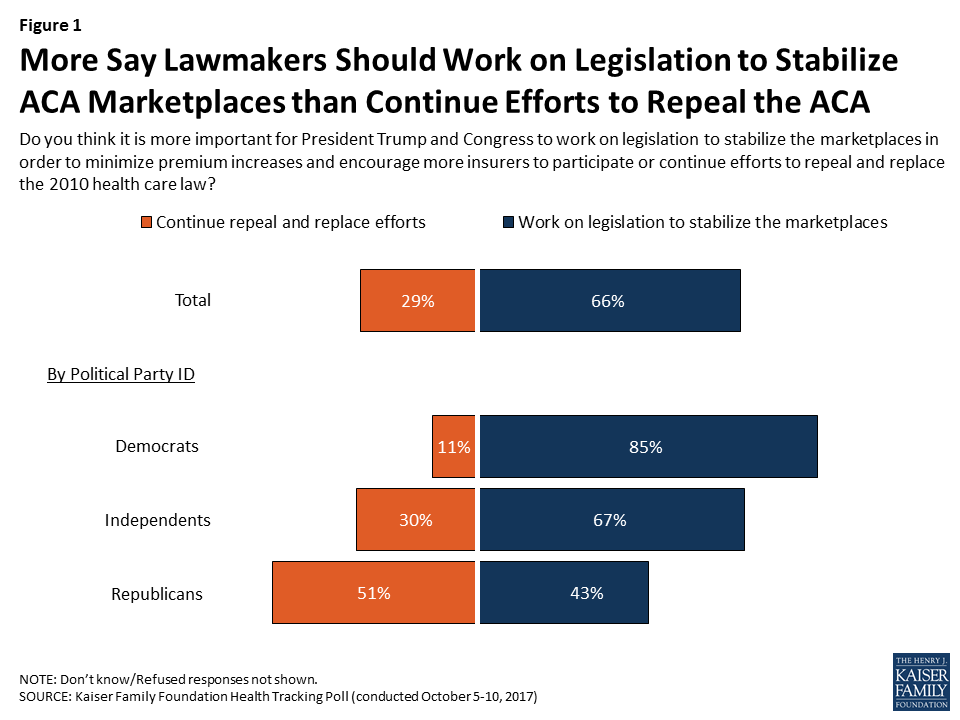
Attitudes Towards Current Proposals to Stabilize the ACA
One proposed step Congress could take to stabilize the markets and control costs for people who purchase their plans on their own is to guarantee payments to insurance companies that help cover the cost of deductibles and copayments for lower-income Americans (known commonly as ‘cost-sharing reduction’ (CSR) payments). The Trump Administration has announced they will stop making these payments, which has led to insurance companies saying they may raise premiums or stop participating in the marketplaces.
When asked what Congress should do, a majority of the public (60 percent) support Congress guaranteeing the funds to continue these payments to help stabilize the insurance market, while one-third think these payments amount to a bailout of insurance companies and should be stopped. While the majority of Democrats (82 percent) and independents (62 percent) say Congress should guarantee the CSR payments, slightly more than half of Republicans (55 percent) say the payments should be stopped.
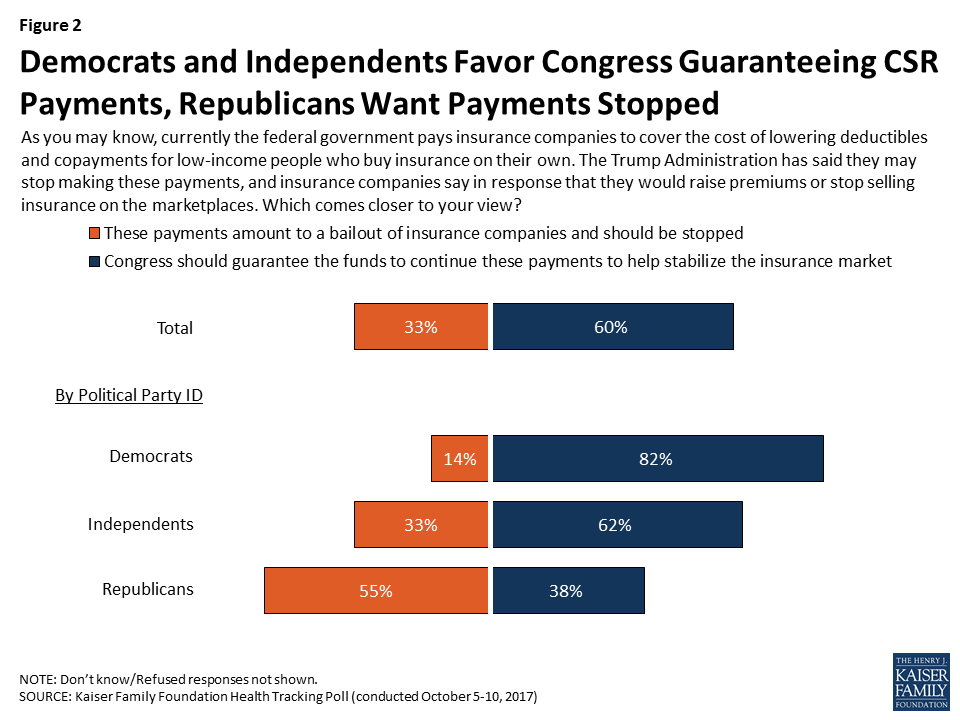
Most Americans Support Bipartisan Compromise on CSR Payments and State Flexibility
As part of the debate surrounding CSR payments and the future of the ACA marketplaces, Senators Lamar Alexander (R) and Patty Murray (D) have been working on a bipartisan effort aimed at stabilizing, rather than replacing, the ACA. When asked whether they support Congress guaranteeing the funds to continue the CSR payments when the proposal is included in a bipartisan compromise that would give states more flexibility in the types of plan sold in their state’s marketplace, a majority of the public (69 percent) – including roughly equal shares of Democrats (69 percent), independents (70 percent), and Republicans (68 percent) – say they support such a compromise.
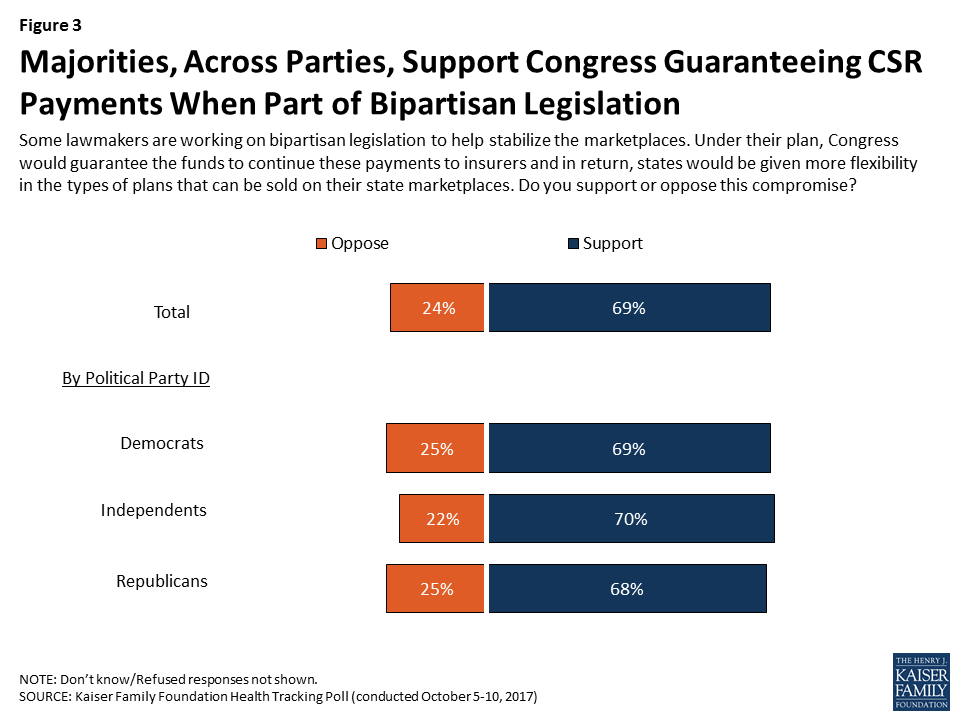
Most Are Not Confident President Trump and Congress Will Be Able to Work Together
Despite support for a bipartisan approach to health care, public confidence that President Trump and Congress will be able to work together to make improvements to the ACA marketplaces remains low, with seven in ten Americans saying they are either “not too confident” (27 percent) or “not at all confident” (43 percent), compared to three in ten saying they are “very confident” (8 percent) or “somewhat confident” (22 percent) that they will be able to work together. Half of Republicans (55 percent) are confident that President Trump and Congress will be able to work together while most Democrats and independents are not confident (85 percent and 71 percent, respectively).
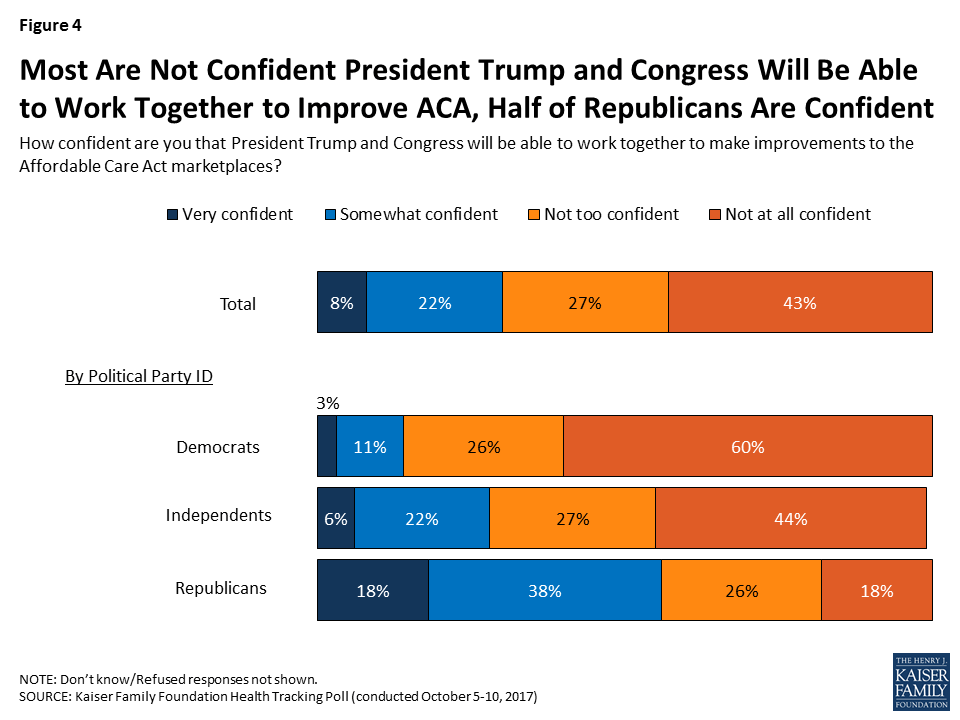
President Trump and the Future of the ACA
On October 12th, President Trump announced a new executive order aimed at making changes to the ACA. Seven in ten Americans (71 percent) think President Trump and his administration should do what they can to make the current health care law work while one in five (21 percent) say they should do what they can to make the law fail so they can replace it later. The vast majority of Democrats (93 percent) say the Trump administration should do what they can to make the law work, as do about three-fourths (74 percent) of independents. Republicans are more divided in their opinions of what the Trump administration should do next. About half of Republicans (48 percent) say President Trump and his administration should do what they can to make the law work while 43 percent of Republicans say the administration should do what they can to make the law fail.
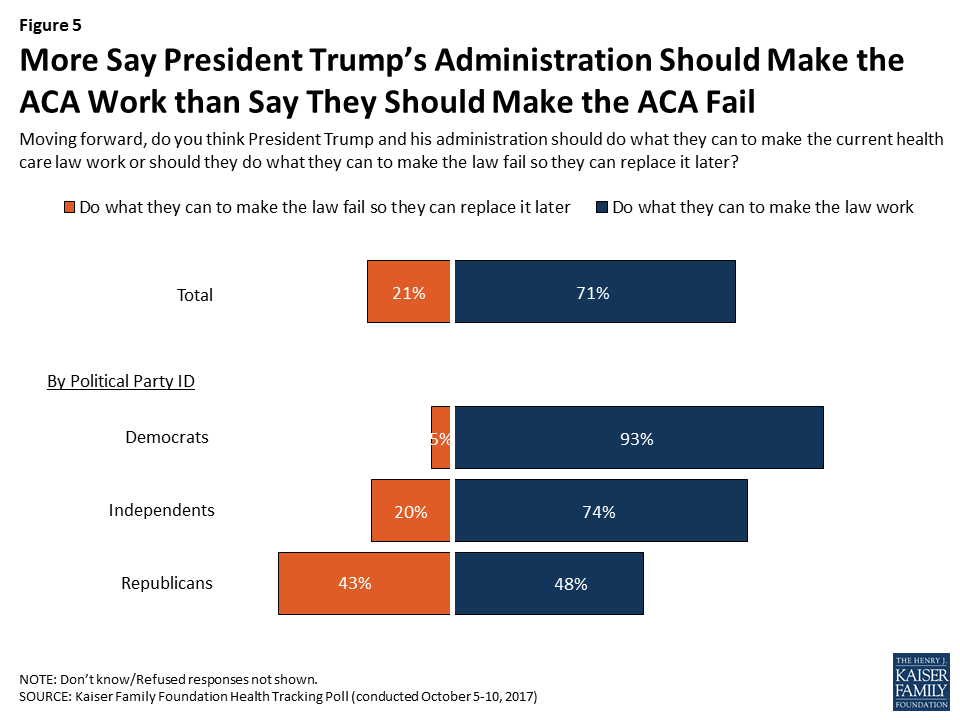
Public Opinion on Trump Administration’s Actions on ACA Marketplaces
In the past few months, President Trump’s administration has made a number of changes related to the ACA and the marketplaces. In general, about twice as many say the actions taken by President Trump and his administration are generally “hurting” (40 percent) the way the ACA marketplaces are working as say the actions are “helping” (19 percent). One-third (34 percent) say their actions are not having much impact on the way the marketplaces are working.

This month’s survey also asked the public whether they approve or disapprove of some of the specific actions the Trump administration has taken with regard to ACA marketplaces. Half of the public approve of the Trump administration decreasing federal spending on advertisements encouraging people to sign up for health insurance and suggesting the federal government may stop enforcing the individual requirement to have health insurance or else pay a fine. On the other hand, six in ten (61 percent) disapprove of the Trump administration decreasing federal funding to organizations that help people enroll in health insurance and half disapprove of limiting federal involvement in community events held by states to encourage enrollment.
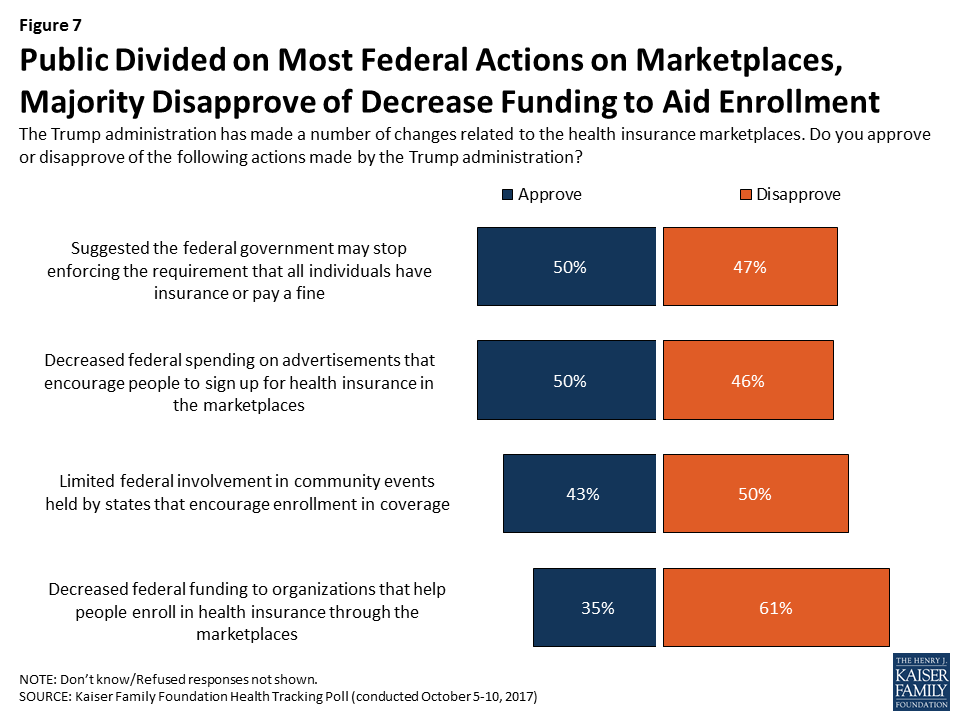
Not surprisingly, approval of the actions taken by President Trump’s administration are largely driven by party identification with the majority of Republicans expressing approval for each of the four actions while few Democrats approve of any of the actions. A majority of independents (64 percent) disapprove of decreasing federal funding to the organizations that help people enroll in health insurance through the marketplaces but across the other issues, independents are largely divided.
| Table 1: Majorities of Republicans Approve of President Trump’s Administrative Actions to the ACA Marketplaces, Majorities of Democrats Disapprove | |||||
| Percent who approve and disapprove of each of the following changes made by the Trump administration: | Democrats | Independents | Republicans | ||
| Suggested the federal government may stop enforcing the requirement that all individuals have insurance or pay a fine | Approve | 29% | 52% | 71% | |
| Disapprove | 66 | 47 | 26 | ||
| Decreased federal spending on advertisements that encourage people to sign up for health insurance in the marketplaces | Approve | 26 | 47 | 81 | |
| Disapprove | 71 | 49 | 17 | ||
| Limited federal involvement in community events held by states that encourage enrollment in coverage | Approve | 19 | 44 | 71 | |
| Disapprove | 75 | 50 | 21 | ||
| Decreased federal funding to organizations that help people enroll in health insurance through the marketplaces | Approve | 15 | 35 | 60 | |
| Disapprove | 81 | 64 | 35 | ||
Half of the Public Holds Favorable Views of the ACA But Also Half Want Debate Over the Law to Continue
Amidst all of this, this month’s tracking poll finds about half (51 percent) of the public expresses a favorable view of the ACA while 40 percent express an unfavorable view of the 2010 law. This is five percentage points higher than the share of the public who held favorable attitudes last month (46 percent) and more similar to August, when more expressed a favorable opinion than an unfavorable one (52 percent vs. 39 percent).
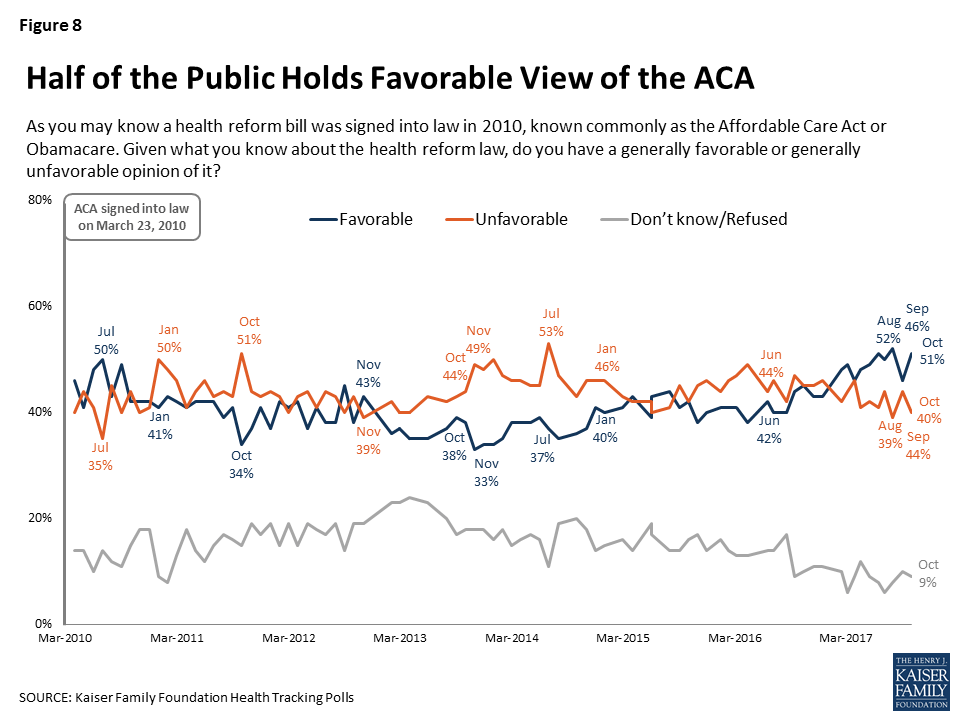
This month’s survey also finds half of the public (54 percent), overall, and across parties – Republicans (52 percent), independents (56 percent), and Democrats (55 percent) – saying it is important for the country to continue the debate over the health care law. Smaller shares – about four in ten – say that they are tired of the debate and think the country should focus more on other issues.

Methodology
This Kaiser Health Tracking Poll was designed and analyzed by public opinion researchers at the Kaiser Family Foundation (KFF). The survey was conducted October 5th-10th 2017, among a nationally representative random digit dial telephone sample of 1,215 adults ages 18 and older, living in the United States, including Alaska and Hawaii (note: persons without a telephone could not be included in the random selection process). Computer-assisted telephone interviews conducted by landline (429) and cell phone (786, including 502 who had no landline telephone) were carried out in English and Spanish by SSRS of Media, PA. Both the random digit dial landline and cell phone samples were provided by Marketing Systems Group (MSG). For the landline sample, respondents were selected by asking for the youngest adult male or female currently at home based on a random rotation. If no one of that gender was available, interviewers asked to speak with the youngest adult of the opposite gender. For the cell phone sample, interviews were conducted with the adult who answered the phone. KFF paid for all costs associated with the survey.
The combined landline and cell phone sample was weighted to balance the sample demographics to match estimates for the national population using data from the Census Bureau’s 2015 American Community Survey (ACS) on sex, age, education, race, Hispanic origin, and region along with data from the 2010 Census on population density. The sample was also weighted to match current patterns of telephone use using data from the July-December 2016 National Health Interview Survey. The weight takes into account the fact that respondents with both a landline and cell phone have a higher probability of selection in the combined sample and also adjusts for the household size for the landline sample. All statistical tests of significance account for the effect of weighting.
The margin of sampling error including the design effect for the full sample is plus or minus 3 percentage points. Numbers of respondents and margins of sampling error for key subgroups are shown in the table below. For results based on other subgroups, the margin of sampling error may be higher. Sample sizes and margins of sampling error for other subgroups are available by request. Note that sampling error is only one of many potential sources of error in this or any other public opinion poll. Kaiser Family Foundation public opinion and survey research is a charter member of the Transparency Initiative of the American Association for Public Opinion Research.
| Group | N (unweighted) | M.O.S.E. |
| Total | 1,215 | ±3 percentage points |
| Party Identification | ||
| Democrats | 369 | ±6 percentage points |
| Republicans | 330 | ±6 percentage points |
| Independents | 378 | ±6 percentage points |